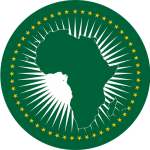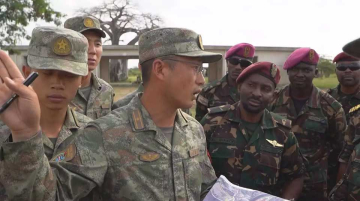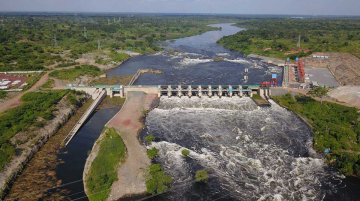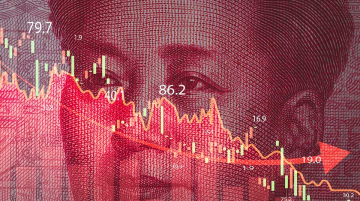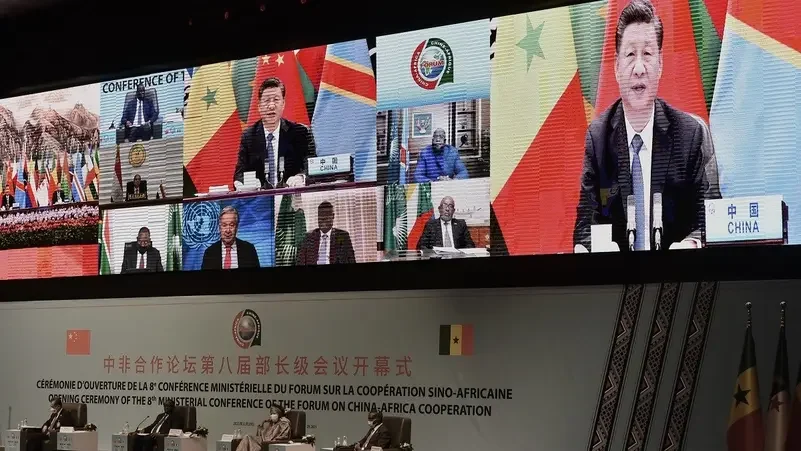
With the ninth Forum on China-Africa Cooperation (FOCAC) now concluded, key themes and outcomes from the meeting have come into focus. While China and Africa remain aligned on many critical issues, the balance between their converging and diverging interests shaped the results of FOCAC 2024 in important ways.
Since its inception in 2000, FOCAC has evolved alongside the changing Africa-China relationship. What began as a platform primarily centered on economic cooperation has now expanded to cover a wide range of priorities that reflect both Chinese and African aspirations.
In these three companion reports, CGSP Managing Editor Cobus van Staden comprehensively analyzes the China-Africa relationship in the context of FOCAC 2024. The first two reports, written ahead of the summit, examine the dynamics leading up to FOCAC 9, exploring the challenges, priorities, and areas of convergence and divergence on both sides while also offering insights into expected developments. The final report, written after the summit, provides a detailed overview of the key achievements and themes from the ninth FOCAC meeting. It highlights how the interplay between continuity and innovation shaped the outcomes and uses these developments to anticipate how the China-Africa partnership may evolve over the next three-year cycle leading to the 2027 summit.
Read the reports:
Pre-FOCAC
- Taking Control: Africa’s Priorities and Challenges at FOCAC 2024
- China’s Agenda at FOCAC 2024: Climate, Connectivity & Coalitions
Post-FOCAC
To read more of CGSP’s coverage of FOCAC, click here.
Taking Control: Africa’s Priorities and Challenges at FOCAC 2024
Key insights:
China’s evolving partnership with Africa is reshaping the continent’s infrastructure, data, and energy landscape. This relationship, punctuated by the triennial Forum on China-Africa Cooperation (FOCAC), is not just about bilateral ties—it’s a strategic framework influencing Africa’s global engagements. As FOCAC 2024 approaches, this report provides an African perspective on the process and priorities that will likely shape the upcoming discussions.
- Strategic Importance: FOCAC has emerged as a pivotal platform in Africa-China relations, driving not just economic collaboration but also influencing Africa’s engagement with other global powers. The forum’s outcomes set precedents that Africa can leverage in its interactions with other international partners.
- Evolving Priorities: While FOCAC began with a narrow scope that mostly dealt with the economic facet of the relationship, successive waves of negotiations between African diplomats and their Chinese counterparts have resulted in a slow expansion of the platform’s purview to include more African priorities. Heading into FOCAC 2024, Africa is focused on collaborating with China on training and technology transfer, increasing Africa’s value share in production and supply chains, and developing a sustainable and robust agricultural industry.
- African Agency: The utility of FOCAC for Africa is increasingly tied to Africa’s ability to set the agenda. Africa’s green energy potential, youthful population, and mineral resources promise a bright future, but low electrification rates and an industrialization backlog present challenges. If Africa hopes to take full advantage of the FOCAC setting, negotiators must be proactive in bringing its priorities to the table.
FOCAC 2024 is positioned to be a critical juncture in the Africa-China relationship, with the potential to drive significant advancements in trade, industrial development, and sustainable cooperation. As Africa navigates this partnership, its ability to influence the agenda will be key to achieving long-term benefits.
China’s Agenda at FOCAC 2024: Climate, Connectivity, and Coalitions
Key insights:
While some might believe that China’s engagement with Africa is primarily driven by a desire for the continent’s natural resources, in reality, the relationship is multifaceted. Africa’s 54 votes at the UN, its substantial youth demographic, and the way that Africa-China cooperation enhances China’s narrative that it is building a global community of developing countries highlight why China remains committed to Africa.
As China navigates increasing global pressure, particularly from the U.S. and its allies, this relationship has become even more critical. The upcoming 2024 Forum on China-Africa Cooperation (FOCAC) in Beijing will be a defining moment for both sides, shaping the trajectory of this vital partnership. This report deals with the Chinese perspective of the China-Africa relationship ahead of FOCAC in September 2024: why Africa matters to China, where the relationship currently stands, and what China’s priorities are going into this meeting.
- Economic Development: While trade expansion remains a priority, the ambitious goal set in 2021 to increase African imports to China has seen modest progress. Still, China remains committed to developing and deepening its economic ties in Africa, and the 2024 FOCAC is expected to renew commitments, with a focus on agriculture and aiding African producers in accessing Chinese markets.
- Political Alliances: Beyond economic interests, China views Africa as a key partner in its efforts to establish alternative global governance structures more in line with its own priorities and less centered around Western power. Africa’s moral weight as the heart of the Global South, and its 54 votes at the UN, make it an important partner in this quest.
- Green Energy and Industrial Development: Reflecting China’s renewable energy investments under the Belt and Road Initiative, the upcoming FOCAC will likely emphasize green energy cooperation. Additionally, China’s expertise in renewable energy positions it as a crucial partner for Africa’s electrification, supporting the continent’s broader industrial development goals.
- Global Connectivity: While FOCAC predates the Belt and Road Initiative (BRI), it has emerged as a key platform for BRI engagement. The BRI has focused on boosting connectivity between China and the rest of the world. This has historically been centered on physical infrastructure but increasingly includes other forms of connectivity, like trade and regulatory integration, ICT, training, and people-to-people exchange. These themes will likely feature heavily at FOCAC 2024.
The 2024 FOCAC summit is poised to reinforce China’s role as a key partner in Africa’s development and a leader in the Global South. Amid ongoing anti-China rhetoric from the U.S., this meeting will be critical in solidifying the strategic, economic, and diplomatic ties that bind China and Africa.
Innovating While Remaining Constant: A Look at the 2024 FOCAC Summit
Overview:
In terms of political optics, the 2024 Forum on China-Africa Cooperation (FOCAC), held from September 4 to 6, faced a delicate balancing act. It needed to showcase continuity with past summits, featuring the traditional elements of welcoming African leaders, conducting numerous bilateral meetings, and announcing new funding targets. At the same time, the forum was under pressure to demonstrate a renewed and reenergized Africa-China relationship for the mid-2020s, one that is both responsive to African demands and aligns with evolving Chinese strategic objectives. In addition, the summit had to reiterate its uniqueness, especially after three years dotted with many other “Africa plus One” summits.
This report outlines the key achievements and themes of the ninth FOCAC summit, highlighting how the balance between constancy and innovation helped shape these outcomes. It also uses these developments as clues for how the relationship will evolve over the next three-year cycle leading up to the 2027 gathering.

